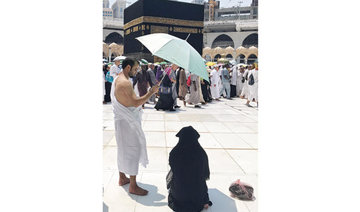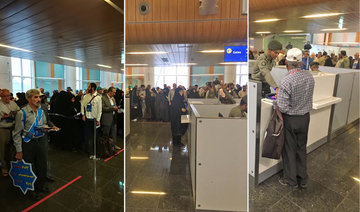RIYADH: The National Society for Human Rights in Saudi Arabia has condemned the “flagrant violation of the human rights, beating, degradation and humiliation” of Qatari citizen Hamad Abdul Hadi Al-Marri after he returned from Hajj, and said filming the assault and publishing the video were “crimes against human rights principles.”
The Society said it had followed the case of Hamad Al-Marri since the publication of the video and verified that the person was Al-Marri, who completed Hajj under the program of the Custodian of the Two Holy Mosques and left Saudi Arabia safe and well.
He had entered the Kingdom through the Salwa border crossing, which was opened
exceptionally for Qatari pilgrims. “The representatives of the society tried to reach the victim Hamad Al-Marri to check on him, but this was impossible because of the closure of all means of communication with him, or the possibility of locating him,” it said.
“We call on the National Human Rights Committee of the State of Qatar and all international human rights organizations to do their duty to ensure the disclosure of the fate of this Qatari citizen; to protect him from the attacks and violations that have been committed against him; to ensure his safety, and that he is not being subjected to pressure imposed by certain political dictates because of his right to perform Hajj and his right to freedom of expression; and to ensure that all those who exploited their political power, abuse and torture are prosecuted.
“We also call on all institutions and institutions in Qatar to work hard to protect Hamad Al-Marri and prosecute those who assaulted him regardless of their positions; and to facilitate his return to
his home and his family and his right to travel and freedom of expression and the enjoyment of all natural guarantees and rights guaranteed by international treaties and human rights conventions.
“The society calls upon the government of Qatar to promptly declare its innocence of this crime, identify and punish the aggressors, and grant the victim Hamad Al-Marri all fair compensations and allow him unrestricted freedom of movement and travel.
The society said it had been established that the attack on Al-Marri was directly related to his appearance in the media, including the Saudi news channel from the holy sites, contrary to the official speech of his country's authorities, which denies the existence of Qatari pilgrims, and his appreciation for the services received by his fellow pilgrims and facilitating their affairs, which is contrary to the official speech of the State of Qatar.
“The National Society for Human Rights asserts that it will provide international human rights organizations with a list of Qataris who have come to Hajj to follow up on their situation and ensure their safety,” it said.
It also called on its Qatari counterpart, the National Human Rights Commission and all human rights associations, organizations and committees in the world to shoulder their legal and moral responsibilities.
The society said it had visited the Qatari pilgrims at their headquarters in the holy sites and confirmed their enjoyment of all their rights, which ensured the performance of their pilgrimage rituals with ease.
Human rights group condemns Qatar over ‘humiliation’ of pilgrim
Human rights group condemns Qatar over ‘humiliation’ of pilgrim

Kingdom arrests 23,194 illegals in one week

RIYADH: Saudi authorities arrested 23,194 people in one week for breaching residency, work and border security regulations, the Saudi Press Agency reported on Saturday.
According to an official report, a total of 13,083 people were arrested for violations of residency laws, while 6,210 were held over illegal border crossing attempts, and a further 3,901 for labor-related issues.
The report showed that among the 1,536 people arrested for trying to enter the Kingdom illegally, 57 percent were Ethiopian, 41 percent Yemeni, and 2 percent were of other nationalities.
A further 57 people were caught trying to cross into neighboring countries, and 23 were held for involvement in transporting and harboring violators.
The Ministry of Interior said that anyone found to be facilitating illegal entry to the Kingdom, including providing transportation and shelter, could face imprisonment for a maximum of 15 years, a fine of up to SR1 million ($260,000), as well as confiscation of vehicles and property.
Suspected violations can be reported on the toll-free number 911 in the Makkah and Riyadh regions, and 999 or 996 in other regions of the Kingdom.
Telemedicine continues to bridge critical-care gaps in Saudi Arabia

- Tech is ‘bridging’ urban-rural divide, says Dr. Amera Rahmatullah
- Physician trains residents in critical-care skills vital for the nation
Riyadh: Telemedicine continues to help bridge treatment gaps in Saudi Arabia for rural areas and others that have a shortage of services, according to a leading physician.
Dr. Amera Rahmatullah, a consultant in pulmonary and critical care at King Faisal Specialist Hospital and Research Centre, told Arab News recently that telemedicine has ushered in a new era of critical care.
Rahmatullah said: “Our Tele-ICU initiative has transformed critical care in Saudi Arabia by bridging the gap between urban and rural healthcare.
“This WHO-accredited program has reduced unnecessary hospital transfers, improved patient outcomes, and provided timely interventions in remote areas, offering seamless, high-quality care across the Kingdom.”
Under Rahmatullah’s leadership, KFSHRC’s Critical Care Medicine department manages a wide range of specialized units, including surgical and organ transplants, medical and oncology units, and COVID-19 units.
With 67 beds, these units admit over 4,000 patients annually, supported by 24/7 consultant coverage and highly trained multidisciplinary teams of physicians, nurses, respiratory therapists, and allied health professionals.
For clinicians in telemedicine, the COVID-19 pandemic blew open the doors of need and access. What had been used before to treat critically ill patients in remote, rural, and hard-to-reach communities was suddenly in play for most of the population.
Recognizing the need to extend its specialized care beyond hospital walls, the Tele-ICU program was launched in 2010, initially to reduce patient transfers and ensure remote communities had access to critical care expertise, said Rahmatullah.
During the COVID-19 pandemic, it expanded rapidly, becoming a lifeline for managing critically ill patients.
Today, the Tele-ICU network provides real-time ICU support across the Kingdom, ensuring high-quality care nationwide.
This initiative is part of KFSHRC’s broader nationwide strategy to expand critical care services, she added.
As the director of the Critical Care Medicine Residency Program, Rahmatullah has been instrumental in shaping the future of this workforce for Saudi Arabia.
She trains residents across various ICUs and equips them with the technical and leadership skills to manage the Kingdom’s most complex cases.
Under her leadership, the residency program has become a key pipeline for future specialists, ensuring that KFSHRC remains at the forefront of healthcare education and innovation.
Rahmatullah is also involved in the COVI-PRONE trial, an innovative research initiative aimed at improving outcomes for COVID-19 patients in intensive care.
KSrelief’s charitable work in Yemen, Afghanistan continues

RIYADH: The King Salman Humanitarian Aid and Relief Center (KSrelief) continues its charitable work in Yemen and Afghanistan, with the provision of medical services and shelter kits to individuals in need.
In Yemen, the Al-Ja’dah Health Center clinics in the Midi District of Hajjah Governorate continued to treat beneficiaries from Aug. 21 to 27 through KSrelief’s support.
The clinics provided comprehensive healthcare services to 96,184 patients, including in the field of internal medicine, reproductive health, pediatrics, communicable disease, and emergency services, treated injuries and referred complex cases, state news agency SPA reported.
The center also secured medicines, medical supplies, laboratory reagents and supplies, and medical and non-medical consumables for 60,823 individuals, treated 123 children suffering from malnutrition and vaccinated 451 children.
In Yemen’s Marib Governorate, the Saudi aid agency provided in November medical services to 453 individuals who had lost limbs. KSrelief’s ongoing project has so given 1,829 various services including fitting and rehabilitating prosthetic limbs, physical therapy and specialized consultations.
In Afghanistan, KSrelief distributed on Thursday 276 shelter kits in Khogyani district of Nangarhar province as part of the 2024 shelter project attending to returnees from Pakistan and people affected by floods.
Saudi Arabia condemns Israel’s burning of Gaza hospital

- Kamal Adwan Hospital was one of the last operating in the northernmost part of the Gaza Strip
RIYADH: Saudi Arabia on Friday denounced the burning of a Gaza hospital by Israeli forces and the forced removal of patients and medical staff from the facility.
Hospital officials said that Israeli troops raided Kamal Adwan Hospital on Friday, gathered staff outside the facility, removed their clothes, and took them to an unknown location.
Israeli soldiers then set fire to several parts of the facility, which is one of the last operating in the northernmost part of the Gaza Strip, including the surgery department, according to the Palestinian health ministry in the enclave.
The actions constitute a violation of international law, international humanitarian law, and the most fundamental humanitarian and ethical norms, said a statement by the Saudi foreign ministry.
Israel claimed Hamas fighters had been operating in the facility, which hospital officials denied.
Saudi Arabia to provide $500m in new economic support for Yemen

- Budget, stability, Central Bank of Yemen targeted
RIYADH: Saudi Arabia announced on Friday a new economic support package for Yemen worth $500 million and aimed at bolstering the government’s budget, stabilizing the Central Bank of Yemen, and fostering the development and stability of the Yemeni people.
The latest assistance includes a $300 million deposit into the Central Bank of Yemen to improve economic and financial conditions, alongside $200 million to address the Yemeni budget deficit, the Saudi Press Agency reported.
The latest funding forms part of a larger $1.2 billion initiative through the Saudi Development and Reconstruction Program for Yemen. The program focuses on enhancing food security; supporting wages and operating expenses; and aiding the Yemeni government in implementing its economic reform agenda.
The new support aims to establish economic, financial, and monetary stability in Yemen by strengthening public finances, building government institutional capacity, and enhancing governance and transparency, the SPA added.
The assistance will empower the private sector to drive sustainable economic growth, create job opportunities, and place Yemen’s national economy on a more sustainable path for economic and social development.
Saudi Arabia’s previous economic assistance included deposits in the Central Bank of Yemen, which increased foreign exchange reserves, stabilized the local currency, reduced exchange rates, and stimulated the growth in gross domestic product.
The assistance also lowered fuel and diesel costs, reduced prices of imported food commodities, and supported the import of essential goods, including wheat, rice, milk, cooking oil, and sugar.
In addition, Saudi grants have helped the Yemeni government manage operating expenses, pay salaries, and mitigate the economic crisis by boosting foreign exchange reserves and restoring confidence in Yemen’s financial institutions.
These measures reduced reliance on borrowing to finance budget deficits, enhanced financial system stability, and alleviated inflationary pressures.
Saudi Arabia has also prioritized critical sectors in Yemen through grants and projects implemented by SDRPY, including more than 260 development initiatives across various Yemeni governorates, covering education, health, water, energy, transportation, agriculture, and fisheries.
These projects have improved access to essential services; provided medical treatments for chronic diseases and cancer patients; supported education; and ensured the provision of petroleum derivatives for electricity generation.
Saudi Arabia’s grants for petroleum derivatives have played a vital role in operating 80 power plants across Yemen, boosting energy efficiency and revitalizing productive and service sectors.























